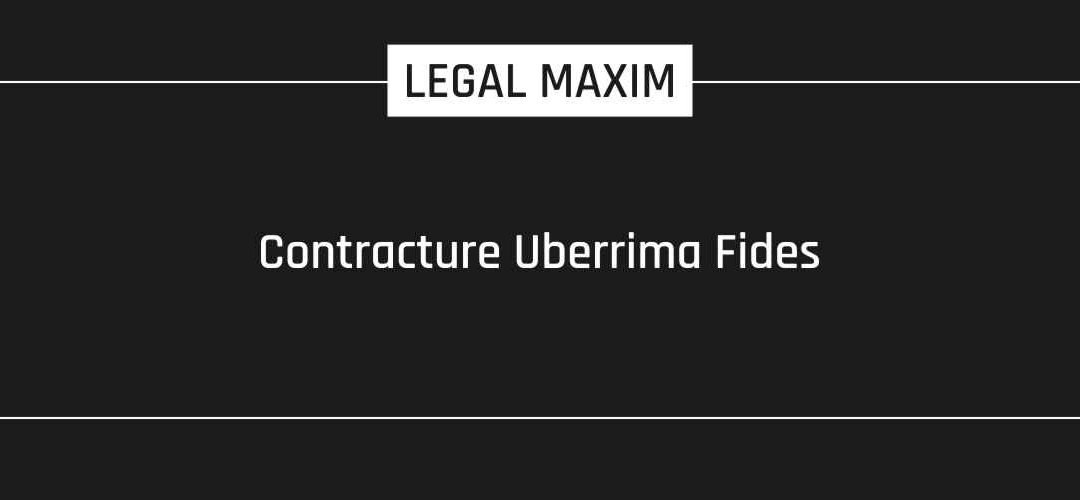Literal meaning
Utmost good faith/ most abundant faith
Origin
Latin
Explanation
The legal maxim uberrima fides refer to utmost good faith. The underlying principle that governs this maxim is that all human acts should be backed by good faith. Talking about, contracture uberrima fides, the phrase means that all kinds of contracts (commercial transactions) must be free from any kind of concealment, fraud, and misrepresentation. It simply says that any contract where the material facts are not disclosed on the part of either party to the contract stands null and void. The maxim majorly governs the insurance contracts. A complete and clear declaration of all material facts is vital for validating a contract. The said maxim, however, contradicts the maxim of Caveat Emptor (let the buyer be aware).
The maxim is sometimes also referred to as uberrimae fidei.
In contract law, the implied covenant of good faith is a general presumption, which states that the parties to the contract are thoroughly aware of all necessary facts with regards to the terms and conditions of contracts, and all material facts have been clearly stated. There exists no ambiguity concerning the contents of the contract. Good faith is presumed to be one of the essentials required to constitute a contract, this intention can be observed by the existence of sections like competency to contract and essential conditions of aa valid contract (also including the section 14 which talks about free consent as an essential of a valid contract). Section 14 of the Indian Contract Act, 1872, clearly rescinds all contracts that came into existence by means other than free consent. Any contract based on concealment of material facts, misrepresentation, fraud, attainment of consent by coercion are all void ab initio, i. e. invalid from the very beginning.
Under criminal law, the principle of good faith as defined under section 52 of the Indian Penal Code 1860, read as ‘Nothing is said to be done or believed in “good faith” which is done or believed without due care and attention’.
Any contract, which is derogatory to the principle of good faith, creates a criminal liability on the wrongdoer.
Contracture uberrima fides, one of the major principles that govern the insurance contracts, create a mutual responsibility on both the insurer and the person insured to disclose all material facts. It states that Contract of Insurance is a contract for discharging mostly the indemnification liability by an insurer for premium tendered by the insured to the insurer.
Illustration
For instance, in a health insurance contract, the insured fails to disclose material facts like suffering from asthma or some other kind of health issue, results in non-disclosure of material facts, and ultimately frees the insurer from all liabilities of indemnifying the insured.
Similarly, if the insurer conceals certain material facts, the contract of insurance stands invalid, rendering the insurance company liable to compensate the insured along with damages and legal expenses.
Case laws
LIC vs. G.M. Channabasamma, (AIR 1991 SC 392) In a landmark judgment, the Apex Court held that the onus of proving that the policyholder has failed to disclose material facts lies in the corporation. It is the fundamental principle of insurance law that utmost good faith must be observed by the contracting parties and good faith forbids either party from non-disclosure of the facts which the parties know.
The above-cited judgment was used as a reference in the decision in another case having similar facts and circumstances, as cited below:
Modern Insulators Ltd. Vs Oriental Insurance Co. Ltd. (2000 (2) SCC 734) It was observed that: “It is the fundamental principle of insurance law that utmost good faith must be observed by the contracting parties and good faith forbids either party from non-disclosure of the facts which the parties know. The insured must disclose and similarly, the insurance company and its agents must disclose all material facts in their knowledge since the obligation of good faith applies to both equally”.
(This Maxim has been written and submitted by Ms. Mansi Batra during her course of internship at B&B Associates LLP. Ms. Mansi is a third-year law student at the Fairfield Institute of Management and Technology, Kapashera, New Delhi.)
